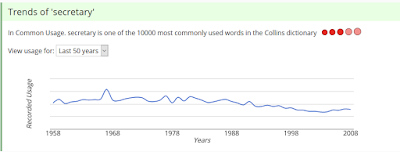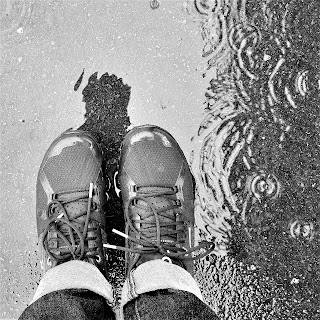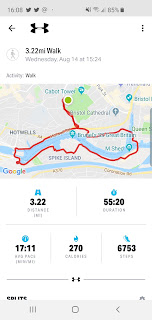"My secretary will fax you the details"
In a recent social media post, ELT writer Katherine Bilsborough was bemoaning the appallingly sexist images that came up when she was searching for secretary on a stock image site. I won't share the images, but I'm sure you can imagine the kind of thing. The post prompted a lot of equally appalled reactions about the actual images, but there were also a couple of comments about whether we even use the word secretary anymore anyway. Which, of course, got me thinking and sent me off to check ...
My immediate reaction and that of several people I spoke to was that secretary, to describe someone who does an admin job, has been replaced as a job title nowadays by 'assistant' of some kind - admin assistant, personal assistant, executive assistant. A bit of googling very quickly turned up several articles to back up my hunch. But what do the stats say?
There is some evidence that usage of the word secretary has fallen off slightly since about the 1980s.
 |
| Source: Google Ngram viewer |
 |
| Source: Collins Dictionary online |
It's difficult to pin down stats though because it's hard to disentangle from its other senses referring to a. political positions (Secretary of State, Home Secretary, press secretary, etc.) and b. formal positions in the hierarchy of certain organizations (Secretary General of the UN, General Secretary of a trade union, club/company secretary, etc.). I looked across several corpora though and took a random sample of corpus lines to scan through. In each case, for recent corpus data, there were a tiny number of cites that referred to the admin assistant sense (less than 5 per 100 cites). Comparing that to the old BNC (from the 1980s and 90s), I came up with around 18 in 100. Not rigorous research but still a fairly clear decline.
So, we're all agreed that secretary is probably as dated as typist or air stewardess. Which begs the question, why was an ELT materials writer looking to illustrate it? Answer: because it's on a (newly updated!) Cambridge exams vocabulary list ... Cue a flurry of further checking ... and I was slightly shocked to find:
- it appears on all the major publishers' word lists - A2 on EVP and (the brand new!) Oxford 3000 and B1 on the Pearson GSE
- it appears in all the major UK learner's dictionaries (Oxford, Cambridge, Collins COBUILD, Macmillan and Longman) without any kind of label or usage note to flag that it's old-fashioned - unlike stewardess which is labelled as 'old-fashioned' in all but one of them. I won't name and shame the dictionary with the example sentence of the title.
I found this particularly disappointing because I know just how aware lexicographers are of trying to keep on top of this kind of thing. I know how much work goes on to try and weed out dated entries and examples from dictionaries. And with most ELT lexicographers being female, we're especially sensitive to anything that smacks of sexism. It seems that this one has just slipped through the gaps.
So, I'm calling on all those dictionary publishers to at least take a look and reconsider your entries and also to relook at your word lists. I know this kind of change can't necessarily always happen overnight, but can you at least promise to check it for your next editions?
Labels: dictionaries, language change, sexism, vocabulary, wordlists








